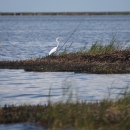States
IowaHistory
On July 9, 2008 four Iowa, Chicago and Eastern (IC&E) railroad engines derailed into the Mississippi River two miles south of Guttenberg, Iowa as a result of a larger boulder on the tracks. The submerged engines leaked 2,108 gallons of diesel fuel and transmission oil that reached five miles downstream.
Oil leaked from the derailed engines and spill response activities impacted fish, wildlife and other natural areas. The spill was within waters that are managed as part of the Upper Mississippi River National Wildlife and Fish Refuge. The Mississippi River ecosystem in Clayton County supports migratory birds and the federally listed endangered Higgins eye pearlymussel (Lampsilis higginsii), the candidate sheepnose mussel (Plethobasus cyphyus) and the candidate spectaclecase mussel (Cumberlandia monodonta). A mussel survey conducted after the cleanup found that there was a “significant mussel bed” present in the area of the derailment, and Higgins eye pearlymussels were also found in the area.
There were significant response related impacts to natural resources resulting from the removal and re-railing of the locomotives. The large boulder on the railroad tracks was blasted into the river, and landed in a mussel bed. A rock ramp constructed from the railroad grade out into the river to assist in the removal of the submerged engines filled over a mussel bed that contained state and federally listed endangered mussel species.
Trustees
The Trustees for the Site, acting on behalf of the public, include the U.S. Fish and Wildlife Service and the Iowa Department of Natural Resources.
The U.S. Fish and Wildlife Service is in the process of updating webpages, so some content that was previously available is temporarily unavailable. Please contact the Illinois-Iowa Ecological Services Field Office for additional information.




